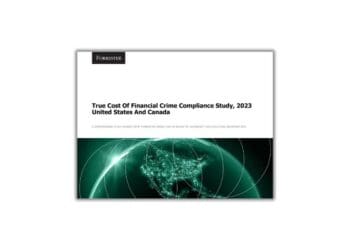Between COVID-19 disruptions, KYC challenges, paused account onboarding and altered due diligence practices, 2020 saw financial crime compliance costs increase by roughly one-third. It remains unclear to what extent those trends will continue this year.
There’s no doubt 2020 has brought many unforeseen hurdles to financial institutions (FIs) like banks and investment, asset management and insurance firms. With those challenges also comes opportunity. What is the business impact of the pandemic on compliance departments? To fully answer the question, we conducted a survey in October 2020 of compliance professionals in United States and Canada to identify the drivers affecting financial crime compliance and how they impact spending and productivity. This included understanding spending by cost of compliance area – sanctions screening, transaction monitoring, technology, know your customer (KYC), due diligence, etc. – and associated human resources costs.
We also explored what FIs have experienced during the COVID-19 pandemic, some of which continues to test the resilience and agility of businesses across many markets. Compliance departments cite several issues, including accessing information sources for KYC due diligence and new account onboarding delays. Our survey found that the cost of financial crime compliance rose sharply since 2019, up to a projected $42 billion across U.S. and Canadian financial firms in 2020, a 33 percent jump from 2019’s total projected cost of $31.5 billion. The study projects the cost in 2020 to be $35.2 billion in the U.S. alone, with Canadian FIs contributing $6.8 billion to the overall figure. What is driving this cost increase?
The Impact of COVID-19 on Financial Crime Compliance Costs
Compliance departments at both large and small FIs have faced a variety of changes during the pandemic and resultant remote working period. Financial crime compliance professionals in the U.S. attribute an average of 23 percent of financial crime compliance cost increases to COVID-19. This stems partially from the implementation of the Paycheck Protection Program (PPP) and increased manual labor costs for FIs to screen for lending-related financial crimes like money laundering. The PPP came swiftly and put pressure on compliance teams to adapt, some even developing new protocols for due diligence in response to differing standards between the Small Business Administration (SBA) and customer due diligence (CDD) beneficial ownership requirements.
The pandemic and other uncertainties increased the risk for financial crime, putting FIs in danger of noncompliance. One notable source of heightened risk over the past year centers on cryptocurrency transactions – these can present issues for due diligence and beneficial ownership.
The top three issues most compliance departments contend with are:
- Difficulty accessing information sources for KYC due diligence (41 percent),
- Challenges from delayed new account onboarding (41 percent) and
- Longer times to complete due diligence for onboarding new accounts (38 percent).
Operational difficulties arising from COVID-19 protocols and subsequent remote working requirements have also negatively impacted the effectiveness and efficiency of key compliance activities. Respondents reported a moderate to significant negative impact on:
- Customer risk profiling (91 percent),
- Sanctions screening (83 percent),
- KYC for account onboarding (78 percent),
- Efficient resolution of alerts (74 percent) and
- Positive identification of sanctioned entities or politically exposed persons (PEPs) (61 percent).
Increased Regulatory Pressure
Regulations continue to put pressure on U.S. and Canadian FIs. The Financial Crimes Enforcement Network (FinCEN) and federal and state financial regulators have increased scrutiny of anti-money laundering and combating the financing of terrorism (AML/CFT) compliance violations and have prioritized these actions. Also added to the mix: FIs are increasingly grappling with issues surrounding due diligence and beneficial ownership arising from digital assets and transactions involving cryptocurrency. To that end, the survey found that a majority of FIs now have formal processes in place for identifying and tracking new types of crime and criminal methodologies.
Canada’s Office of the Superintendent of Financial Institutions (OSFI) increased risk assessments on banks to tighten compliance and bring about changes to Canadian AML laws. The Proceeds of Crime (Money Laundering) and Terrorist Financing Act (PCMLTFA) continues to place pressure on FIs to strengthen customer due diligence around ultimate beneficial ownership (UBO). All this adds up to a greater burden on compliance departments. Technology can be the answer to this burden.
Good Technology Lowers Costs
The study shows that FIs who invested in technology solutions to support financial crime compliance experienced lower cost increases and fewer negative impacts from COVID-19. Year-over-year compliance cost increases proved lower for FIs that allocated more spend to technology. These FIs also noted greater efficiencies. Larger FIs with more than $10 billion in assets in the U.S. and Canada who allocated at least 50 percent of their compliance costs to technology spent $5 million less on average in annual costs in 2020 than FIs who allocated 35 percent or less.
Skilled compliance professionals will certainly continue to be in demand as financial crime grows in complexity, yet skilled labor is scarce in this market. Financial firms should consider fast-tracking efforts to implement compliance technology to drive operational efficiency and better utilize their high-value resources.
So, What Now?
There are several implications revealed by the study. What’s clear is that U.S. and Canadian FIs should prepare for increased risks of financial crime for the foreseeable future. It is unclear what the landscape will look like over the next one to two years, but FIs should anticipate facing greater spikes in financial crime, particularly as digital/cryptocurrency transactions provide new criminal opportunities.
Financial firms that have invested in compliance technology will be better prepared to deal with the new normal and weather sudden changes. As the cost of doing business rises in the COVID-19 environment and beyond, the added cost of compliance may reach a tipping point where adding more labor to solve complex compliance matters may result in diminishing returns for FIs. In addition to implementing new compliance technologies, it is difficult for FIs to make well-informed risk decisions without robust and comprehensive data. Ultimately, one of the best paths forward involves rigorous investigative tactics that vet the most current data and customized delivery systems that adapt to the user.
Having comprehensive data and highly capable solutions generates a degree of utility for not just compliance, but other functional areas as well, such as business development and marketing. Knowing more about customers can help FIs present the right products and services for cross-selling initiatives. Compliance departments at FIs have faced unprecedented challenges during the pandemic. While 2020 was difficult for the industry, compliance teams can become more effective and efficient with essential compliance activities through a risk-responsive financial crime compliance strategy and a multilayered solution approach to due diligence and financial crime risk assessment. Efficient technology, intuitive analytics and extensive global risk intelligence give FIs the insight they need to better navigate the new normal brought on by the pandemic, like cryptocurrencies and digital assets, while maintaining integrity throughout the customer experience.



 Leslie Bailey is the senior director of business services for
Leslie Bailey is the senior director of business services for 






